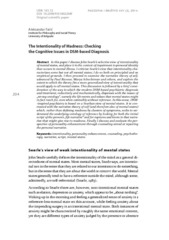The Intentionality of Madness: Checking the Cognitive Issues in DSM-based Diagnosis
Апстракт
In this paper I discuss John Searle’s selective view of intentionality of mental states, and place it in the context of impairment to personal identity that occurs in mental illness. I criticize Searle’s view that intentionality cha¬racterizes some but not all mental states; I do so both on principled and on empirical grounds. I then proceed to examine the narrative theory of self, advanced by Paul Ricoeur, Marya Schechtman and others, and explore the extent to which the theory fits a more generalized view of intentionality that would apply to all mental states. This discussion is followed by a brief consi¬deration of the way in which the modern DSM-based psychiatric diagnosis and treatment, reductively and mechanistically, dispenses with the issues of „strong ontology“, namely the life events and values that mental states might in fact reach for, even when ostensibly without reference. In this sense, DSM- -inspired psychiatry is based on a Searlian view of mental states. It is con¬tra...sted with the narrative theory of self (and therefore also of mental states) which, rather than defining madness by clusters of symptoms, seeks to un¬derstand the underlying ontology of reference by looking for both the initial script of the person’s „life narrative“ and for ruptures and knots in that narra¬tive that might give rise to madness. Finally I discuss and evaluate the per¬spective of personality enhancement through counseling aimed at repairing the personal narrative.
Кључне речи:
intentionality / personality enhancement / counseling / mentalna stanjaИзвор:
Filozofija i društvo / Philosophy and Society, 2014, 204-216Издавач:
- Beograd : Institut za filozofiju i društvenu teoriju
Институција/група
IFDTTY - JOUR AU - Fatić, Aleksandar PY - 2014 UR - http://rifdt.instifdt.bg.ac.rs/123456789/221 AB - In this paper I discuss John Searle’s selective view of intentionality of mental states, and place it in the context of impairment to personal identity that occurs in mental illness. I criticize Searle’s view that intentionality cha¬racterizes some but not all mental states; I do so both on principled and on empirical grounds. I then proceed to examine the narrative theory of self, advanced by Paul Ricoeur, Marya Schechtman and others, and explore the extent to which the theory fits a more generalized view of intentionality that would apply to all mental states. This discussion is followed by a brief consi¬deration of the way in which the modern DSM-based psychiatric diagnosis and treatment, reductively and mechanistically, dispenses with the issues of „strong ontology“, namely the life events and values that mental states might in fact reach for, even when ostensibly without reference. In this sense, DSM- -inspired psychiatry is based on a Searlian view of mental states. It is con¬trasted with the narrative theory of self (and therefore also of mental states) which, rather than defining madness by clusters of symptoms, seeks to un¬derstand the underlying ontology of reference by looking for both the initial script of the person’s „life narrative“ and for ruptures and knots in that narra¬tive that might give rise to madness. Finally I discuss and evaluate the per¬spective of personality enhancement through counseling aimed at repairing the personal narrative. PB - Beograd : Institut za filozofiju i društvenu teoriju T2 - Filozofija i društvo / Philosophy and Society T1 - The Intentionality of Madness: Checking the Cognitive Issues in DSM-based Diagnosis SP - 204 EP - 216 DO - 10.2298/FID1402204F ER -
@article{
author = "Fatić, Aleksandar",
year = "2014",
abstract = "In this paper I discuss John Searle’s selective view of intentionality of mental states, and place it in the context of impairment to personal identity that occurs in mental illness. I criticize Searle’s view that intentionality cha¬racterizes some but not all mental states; I do so both on principled and on empirical grounds. I then proceed to examine the narrative theory of self, advanced by Paul Ricoeur, Marya Schechtman and others, and explore the extent to which the theory fits a more generalized view of intentionality that would apply to all mental states. This discussion is followed by a brief consi¬deration of the way in which the modern DSM-based psychiatric diagnosis and treatment, reductively and mechanistically, dispenses with the issues of „strong ontology“, namely the life events and values that mental states might in fact reach for, even when ostensibly without reference. In this sense, DSM- -inspired psychiatry is based on a Searlian view of mental states. It is con¬trasted with the narrative theory of self (and therefore also of mental states) which, rather than defining madness by clusters of symptoms, seeks to un¬derstand the underlying ontology of reference by looking for both the initial script of the person’s „life narrative“ and for ruptures and knots in that narra¬tive that might give rise to madness. Finally I discuss and evaluate the per¬spective of personality enhancement through counseling aimed at repairing the personal narrative.",
publisher = "Beograd : Institut za filozofiju i društvenu teoriju",
journal = "Filozofija i društvo / Philosophy and Society",
title = "The Intentionality of Madness: Checking the Cognitive Issues in DSM-based Diagnosis",
pages = "204-216",
doi = "10.2298/FID1402204F"
}
Fatić, A.. (2014). The Intentionality of Madness: Checking the Cognitive Issues in DSM-based Diagnosis. in Filozofija i društvo / Philosophy and Society Beograd : Institut za filozofiju i društvenu teoriju., 204-216. https://doi.org/10.2298/FID1402204F
Fatić A. The Intentionality of Madness: Checking the Cognitive Issues in DSM-based Diagnosis. in Filozofija i društvo / Philosophy and Society. 2014;:204-216. doi:10.2298/FID1402204F .
Fatić, Aleksandar, "The Intentionality of Madness: Checking the Cognitive Issues in DSM-based Diagnosis" in Filozofija i društvo / Philosophy and Society (2014):204-216, https://doi.org/10.2298/FID1402204F . .



